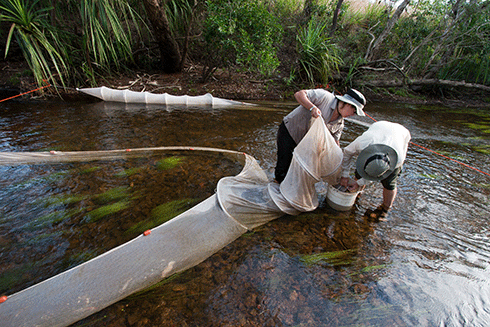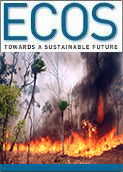
|
Published: 6 October 2014
Getting the water balance right will be key to developing the north
Scientists have warned that increased water extraction in northern Australia will require trade-offs between different groups and industries, as plans progress to develop the north for greater agricultural production.

|
|
An experiment in the Edith River, Northern Territory. Credit:
Northern Australia Hub
|
Director of the Northern Australia Hub of the National Environmental Research Program (NERP), Professor Michael Douglas, says new information is available that can help northern land managers avoid repeating the mistakes made in southern Australia, which have led to widespread river degradation.
‘Freshwaters are the most threatened ecosystem on the planet, and have the highest extinction rates of any ecosystem,’ Professor Douglas said.
‘Changing natural flow regimes is the single biggest threat to tropical river health.
‘Through the Northern Australia Hub’s research, we now have a much better understanding of environmental flows and the breeding biology of freshwater fish.
‘For example, we know it’s possible to extract more water for irrigated agriculture, but this will have downstream impacts on the catch of coastal fisheries, and key bush tucker species targeted by Aboriginal people.
‘It’s important to get the balance right between the freshwater needs of agriculture, and river ecosystems and coastal fisheries, because water allocation impacts on the environment, people’s livelihoods, and the economy.
‘Billions of dollars have been spent trying to address over-allocation in the Murray–Darling Basin, but we have the opportunity to get it right in northern Australia and avoid wide-ranging social and economic impacts.’
In the north, more than a million gigalitres of rain falls over the landscape every year, but evaporation rates greatly exceed rainfall across all areas of the tropics.
Throughout the dry season, groundwater maintains discharges to the ocean from the few rivers that flow year-round.
‘Lower flows reduce river connectivity and habitat, and this will reduce catches of important barramundi and prawn fisheries so we need to be very careful about extracting water,’ Professor Douglas said.
‘The north’s iconic landscapes and wildlife are the drawcard for a multi-billion dollar tourism industry and commercial and recreational fishing. They are also home to important cultural values and practices.
‘Regular river-health monitoring aimed at detecting changes in the system will help us to sustainably manage our water resources into the future.’
Source: NERP



